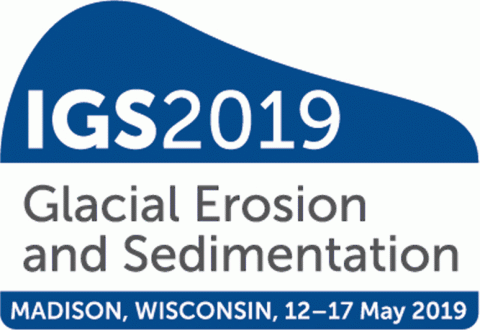The International Glaciological Society will hold an International Symposium on ‘Glacial Erosion and Sedimentation’ in 2019. The symposium will be held at the Pyle Center in downtown Madison, Wisconsin, USA on 12–17 May 2019.
THEME:
Since the last IGS symposium on glacial erosion and sedimentation in Reykjavik in 1995, techniques for characterizing these processes and their associated landscapes and sediments have improved markedly. Diverse remote-sensing techniques measure subaerial and submarine landforms at extraordinarily high resolution, and geophysical methods reveal evolving subglacial landscapes and processes. New and refined geochronological techniques better constrain rates of erosion and deposition. Increased computer power allows models that address coupled processes of glacier flow, bedrock erosion, sediment transport and tectonic change over long time and length scales. New field and laboratory methods provide insight into the mechanics and kinematics of sediment-transport processes and their manifestations in glacial sediments.
Interesting and stubbornly enduring questions accompany these advances. How can glacial sediments and landforms inform us about glacier dynamics and how are glacier dynamics modulated by sediment-transport processes? How can large-scale models of glacial landscape evolution better approximate the small-scale processes that drive erosion and sediment transport? How can past climate variability be inferred from glacial sediments and landforms? How have rates of glacial erosion and sedimentation changed through time? How are drumlins and other subglacial bedforms sculpted, and what data can provide definitive hypothesis tests?
SUGGESTED TOPICS:
We seek papers and presentations on processes and products of glacial erosion and sedimentation and their relationships to glacier dynamics. Key focus areas include (but are not limited to):
- Processes and patterns of glacial erosion, sediment transport and deposition
- Glacial history and dynamics, as inferred from sediments and landforms
- Sediment transport feedbacks on glacier dynamics
- Models of glacial landscape evolution
- Rates of glacial erosion and sedimentation
- Origins of glacial landforms
- Geophysical studies of glacial landforms and subglacial processes
- Climate signals of glacial sediments
- Hazards associated with glacial sedimentation and erosion.
Participants who wish to present a paper (oral or poster) at the Symposium will be required to submit an abstract by 5 February 2019 (deadline has been extended).
For more information, please see the link above.

